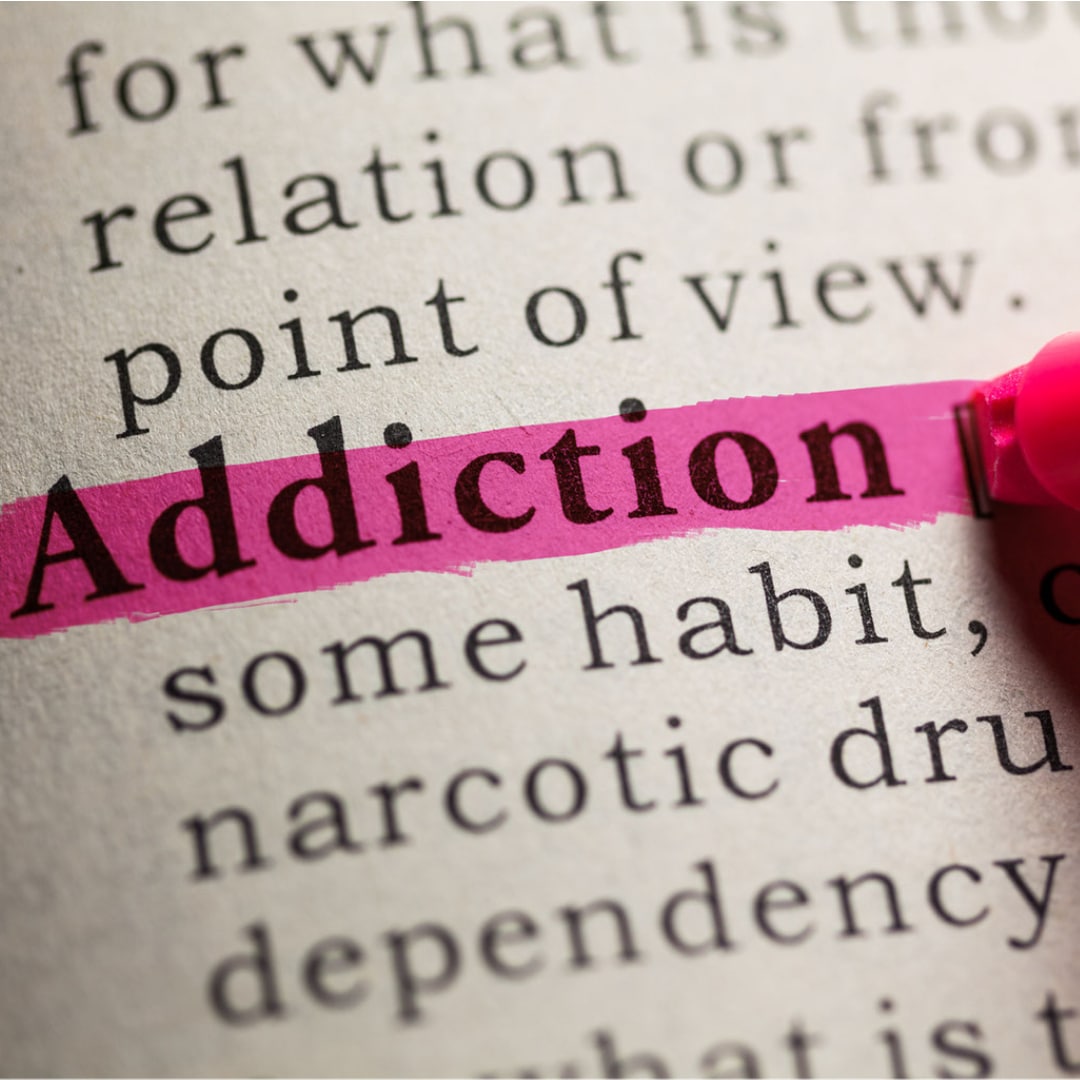Online Addiction Counseling
in California, Nevada, & Florida
How to stay sober: Long-term recovery solutions
With virtual counseling, you can increase your confidentiality to protect your reputation and privacy so you can relax and focus on your sobriety.
You are not alone. You are not weak. You are not strange or worthless. Struggling with substance use is nothing to be ashamed about. Asking for help is hard and shows your strengths.
When you examine it, addiction is a cycle caused by brain dysfunction and is most likely linked to mental health conditions, traumatic experiences, environmental factors, or genetics.
Your compulsive behaviors and cravings cause you to get stuck in a never-ending cycle of giving in to your vice. It doesn't seem to matter how dire the circumstances become. The craving is stronger. You just keep indulging and indulging despite the consequences.
Dependence on substances is much more common than most people think. Research shows that 1 in 3 people is addicted to something. That "something" ranges from things like shopping and food to gambling, drugs, and alcohol.
In short, “something” is messing with your life in a way that controls you, disrupts your life, takes your time, and causes you harm. Your “something” could be alcohol, drugs, work, nicotine, gambling, food, shopping, gaming, pornography or any number of things.
No matter what is disrupting your life, you can get back control and live life on your terms. Therapy solutions for addicts are always in demand. Alcohol and drug dependence top the list. Online therapy for addiction recovery can help you figure out how to stay sober.
Understanding addiction isn't common knowledge in our society. It is often the subject of news reports and articles, but the focus is mainly on how bad the problem is. Solutions are not usually mentioned. Therapy services are rarely mentioned with addiction treatment options.
Finding solutions requires creativity and understanding. You have probably been misunderstood and treated disrespectfully. It's not easy being the only one who is making changes. It can feel like you're constantly swimming against a strong current.
Keep in mind that they don't understand, and you deserve the same level of respect as anyone else. You have the capacity to succeed. Counseling sessions can help you through the process with understanding and respect.
Addiction counseling can help you learn how to stay sober, see your worth clearly, and notice your strengths and abilities. Mental health treatment can be considered as well. The treatment process doesn't need to be harsh. You need support. Knowing you have someone in your corner who understands and sees your worth can carry you through each day.
Types of Addiction
Many people experience a mix of different types of addictions.
The most common types are:

Alcohol: Overuse of alcohol is widespread. It can fly under the radar as an undiagnosed substance use disorder due to social acceptance. Binge drinking is a dangerous issue that is a big part of socializing for young adults.
Many people don't have an issue keeping their alcohol use at a responsible level. However, misuse can have serious consequences, including health problems, cognitive impairment, and sudden death in the case of binge drinking.
Regular drinking can cause damage to your brain both structurally and functionally. Alcohol consumption can cause changes in your brain circuits involved in rewards, stress, and impulse control. It also disrupts your sleep cycle.
Quitting alcohol abruptly after heavy usage can lead to acute alcohol withdrawal and put you at risk for serious medical complications. It is essential for heavy drinkers and those with medical concerns or underlying conditions to get professional medical detox with close 24-hour supervision. Alcohol addiction treatment needs to be approached with care.
Tobacco: Tobacco is well-known for its ability to cause dependence. Smoking is often the last thing to quit in substance abuse treatment.
Tobacco use has deadly health consequences. Nicotine increases the production of adrenaline and dopamine. The increase of this combination creates a sweet spot for cravings. The effects can be so strong they can wake you in the middle of the night, demanding more nicotine. Physical and mental withdrawal symptoms make it difficult to quit.
Drugs: Illicit drugs and prescription medications can both lead to dependence. Drugs like heroin, cocaine, and methamphetamines are often the first to come to mind. However, prescription medications are abused more commonly than illicit drugs. It is easy to start taking a prescription medication as prescribed and find it no longer provides the original level of relief at the specified strength.
Substance dependence can lead to health problems. It can also impact every area of your life, from personal relationships to job performance. You can experience cognitive and mental health problems that can lead to mental illness. Your finances will eventually suffer as well. Drug abuse is invasive and takes over your life.
Behaviors: We don't usually think of behaviors as addictive. However, behaviors can lead to significant disruptions in your life. They can cause relationship problems, financial issues, and even health problems.
The most common addictive behaviors are gambling, shopping, and video gaming. These compulsive behaviors light up the same parts of the brain as illicit drugs. They give you the same kind of feeling as using drugs, and the reward reinforces the behavior. The feeling of winning or finding a deal while shopping can be addictive.
Food: We think of food as a necessity for life. It is a source of nutrition our bodies need. However, even a good thing like food can become harmful. You can suffer from serious medical and mental health issues from using food in unhealthy ways.
Food is a common coping tool. It can temporarily stave off stress and emotional pain. Some consequences of using food to cope are chronic pain, depression, anxiety, high blood pressure, heart problems, insulin resistance, type 2 diabetes, metabolic syndrome, and liver disease.
The foods that tend to be most calming and comforting are also extremely high in fat, salt, and sugar. In fact, food manufacturers create just the right balance of fat, sugar, and salt in a lab for each product to find the "sweet spot" where your body gets confused and doesn't know when to stop eating.
Food manufacturers aren't interested in your physical and emotional health. They are only interested in creating a product that will make a profit. Unfortunately, their manufacturing practices create products that cheat and use your brain's reward system against you. As a result, you compulsively continue to eat even if you aren't hungry and don't have your brain's help telling you when to stop.
Addiction counseling is different for everyone. Each person has unique needs, and not everyone wants the same things from life. The picture of your desired future is yours alone. Your therapy sessions should also be one of a kind to match your personality and concerns and cover mental health.
Finding the right treatment for your personalized needs can help you overcome any of these different addiction types in a way that fits who you are and in a comfortable way for you to live your life. Recovery is not a one-size-fits-all process. It is an individualized experience based on what is most important to you and what you want you want your life to be like when addiction isn't getting in your way.
Understanding Addiction

Addiction is not a simple condition. It's a multifaceted issue that can significantly impact individuals, their families, and friends. It goes beyond simply craving a substance. Developing a dependence on something involves a number of variables.
Addiction can be the result of unsuccessfully treated mental health concerns, emotional issues, or overprescribing of pain medications. Other precipitating causes are an unstable home environment, experiencing abuse, and lack of medical care. There are many other possibilities, ranging from untreated ADHD to abuse.
For long-term recovery to succeed, a full range of issues must be addressed. The underlying causes that led to the need to self-medicate need to be solved so you can feel stable and able to function without substances. Seeing dependence as a symptom of other problems shifts the focus to treatment solutions rather than just managing the addiction itself.
Understanding addiction requires keeping an open mind and listening. It is often helpful to explore how you benefit from the substance or other dependencies. Knowing how addiction is helpful can lead to sustainable solutions and show you how to stay sober long-term. Individualized treatment programs can help you find tailored solutions.
The impact of addiction symptoms extends to personal relationships and social connections. Loved ones can experience stress, trauma, fear, and uncertainty as they try to support someone in recovery. Recognizing this ripple effect highlights the importance of addressing addiction with compassion and empathy, considering the client's needs and relationships.
Treatment Process and Focus
Addiction counseling can help you develop your own sense of sobriety. Understanding addiction helps you open up to solutions that fit who you are and what you want your life to look like when dependency is no longer a problem.
There is always a reason for becoming dependent. It doesn’t happen in a vacuum. Addiction often comes with other life issues. Substance abuse and mental health concerns often come hand in hand.
Relationship problems, ADHD, anger, low self-esteem, depression, anxiety, trauma, PTSD, grief and loss, and underlying mental health conditions often accompany addictive behaviors. Not every treatment center is equipped to address co-occurring diagnoses.
Everyone has their own unique mix of circumstances that got them where they are, and everyone has their own ideas of what they want their life to look like without addictions running the show. Mental health care should always be part of addiction support and drug and alcohol treatment.
Choosing a therapist who creates individualized treatment programs can help you untangle all the parts of your addiction. Therapy for drug and alcohol recovery requires a treatment setting where you feel safe, respected, and private. Online counseling can provide a confidential and discrete environment if you don't require a higher level of care.
A connection exists between dependence and different areas of your life experience. Professional psychotherapy services that take into account the emotional, physical, and social factors that play a role in becoming dependent are more likely to be successful.
Emotional experiences and undiagnosed conditions are often an underlying cause of illicit drug use and other addictions. For instance, undue stress, burnout, or trauma are common precursors. Undiagnosed mental health issues can also lead to substance use. Mental health professionals with training in addiction help you connect the dots and find solutions.
Addiction is a problem in society. It ruins lives. There is a constant search for therapy solutions for addicts that can make a difference. Many addiction programs seem to have a revolving door where the same clients come and go at different intervals. Not all treatment programs are the same.

Types of Therapy for
Drug and Alcohol Addiction
The types of treatment available can vary greatly from program to program. Some have many more options available. If you need to go the facility route, the more you can choose from, the better. In addition to working with a drug counselor, individual and group therapy sessions are helpful to address the mental health side of addiction. You should not have to choose between addiction, substance use, or mental health support. All three are necessary.
We need to make changes that make recovery programs more respectful, inclusive, and sustainable. With more focus on the characteristics, strengths, and abilities clients already have and how to use them in different ways, foundations for recovery and sobriety will become stronger. When progress is noticed and validated without bringing up relapse as a failure, it can be seen as an opportunity to learn what works and what doesn't.

Recovery is not a willpower process.
Addiction isn't a choice. It isn't a symptom of being weak. It's not a lack of or an inability to use willpower. Addiction doesn't say anything about who you are as a person. You do not lack character.
Individuals with substance use disorders and other addictions are not less human. People are more than what they do or say. At your core, you are the true version of yourself. That part of you is always there, whether you can see it or not. It is always available to you. Addiction isn't who you are.
It is unnecessary to be at your worst or land at rock bottom to start the recovery process. You can be successful no matter how much or little you are engaging in illicit drug use. You don't even need to be absolutely sure you're ready.
Motivation doesn't only come from feeling your absolute worst. Everyone has motivation. Yours is unique to you. You just need to find it. Addiction therapy with unique treatment solutions can help.
Addiction isn't a choice you made. You didn't choose this. Nobody would choose something that causes so much suffering. There is no blame.
Therapy solutions for addicts: Addiction Counseling
The word "addict" describes someone struggling with substance abuse. It's not a word I like to use. Being addicted to something doesn't make you less human. Addiction doesn't define who you are. I see dependency as a symptom. Chronic substance abuse is a symptom that can lead to your solution.
Individualized treatment that addresses the unique needs of each person struggling with addiction has shown great promise. Personalized therapy addresses the specific issues that contribute to each client's addictive behaviors. You want long-term recovery solutions. Individualized therapy can help you find lasting solutions. Online substance addiction therapy can add an extra layer of confidentiality to your recovery.

Online Private Therapy for Sobriety:
Online Addiction Counseling
When you choose to address your dependence individually, your therapist can tailor their approach to meet your personal needs. Focusing on the underlying causes of addiction to help you build a detailed vision of the future you want can create practical and long-lasting recovery outcomes.
Therapy solutions for "addicts" include awakening lost hobbies and interests. Your solutions can go beyond traditional addiction techniques by providing space for self-expression, improving self-esteem, and promoting healing. These activities can help build hope and provide different environments and experiences to explore your thoughts, emotions, and motivations.
Personal growth and self-awareness naturally happen when you do things that enhance your life experience. Therapy solutions for "addicts" and different types of addictions should be multidimensional and flexible. It's essential to address the complex nature of dependency while honoring the unique process of sobriety.
Individualized treatment programs have the flexibility for you to "try on" different ways of being until you find what fits your unique needs. Online addiction counseling provides flexibility and privacy while your therapist supports you in discovering what works.

Individual counseling for personalized treatment and long-term recovery solutions
Individual counseling is a cornerstone of personalized treatment plans for addiction recovery. A one-on-one approach creates a safe environment to address mental health, specific underlying issues, traumas, and triggers.
The collaboration helps you come up with alternatives to substances and make lifestyle changes. Through tailored therapy sessions, you can examine choices and opportunities from different angles to find what works for you. Individualized therapy sessions create a safe space for sustainable healing.
Individual counseling for sobriety offers a unique opportunity to focus solely on your own needs and challenges. A therapeutic relationship with your therapist built on trust and open communication sets you up for success. A stable and trusting relationship creates a comfortable atmosphere for new insights and breakthroughs to support you through your recovery.
Finding alternatives for addictive behaviors and addressing biological problems can build your recovery foundation. Once you know what you want instead of the addictive lifestyle, you can start to make changes that lead you there. You can develop coping strategies specifically tailored to your unique circumstances for long-term success.
Choose addiction counseling with a therapist you feel comfortable with. They can help guide you so your solutions line up with what you want in life. You need to feel fully at ease to get the full benefits of psychotherapy. There is nothing to be embarrassed about. Your therapist is on your team.
How to stay sober
for
overall well-being

Long-term recovery solutions are needed to meet lifetime sobriety goals. Staying sober is not just abstaining from alcohol or drugs. Addiction touches every aspect of your life. You need a comprehensive plan.
Personalized addiction recovery counseling can help you look at each aspect of your life. You can take the time to address every issue individually and find solutions that work for you to maintain your sobriety in each situation.
Maintaining sobriety requires a holistic approach to overall well-being. A key aspect is a strong support system. Your support system can include anyone you are comfortable with, including friends, family, and sober companions who understand sober living.
Activities that bring you joy and purpose can also be helpful. You may want to pick up where you left off on a hobby, start an exercise routine, or volunteer for a cause close to your heart.
Prioritizing self-care is essential in maintaining sobriety for long-term well-being. Personal self-care includes healthy sleep routines, good nutrition, and regular exercise.
Developing a sober lifestyle. Staying sober is a different lifestyle. It's not a one-and-done project. Staying sober is continuously making choices aligned with your view of yourself in your preferred future. It impacts who you choose to spend time with and the activities and social situations you choose to engage in.
Learning how to stay sober is a process that goes more smoothly with supportive counseling. Understanding dependence and how it impacts you is a good place to start. When you choose personalized addiction recovery, you can easily celebrate each small victory along the way as you continue to move step-by-step toward the future you want. Over time, you will realize you have long-term recovery solutions that work for you.
What is online addiction treatment for substance abuse?
In recent years, there has been an increase in the number of people struggling with addictions. Substance abuse is a significant problem in the United States, and finding the help you need can be challenging.
Traditional rehab programs can be expensive and time-consuming. You may not have access to a traditional rehab program within a reasonable distance. Not all addiction counseling programs have the same community feel you may be looking for. Maybe you're looking for more anonymity and privacy.
In some communities, there is a common misconception that becoming addicted is a lifestyle choice and that people with mental health or who struggle with substances are weak-willed. The stereotype of weakness could not be further from the truth.
Addiction is a chronic, progressive disease that requires professional care. Unfortunately, many people who need counseling don't get the treatment they need. They do not have access, can't take time off work and away from family obligations, or cannot afford a traditional program in a facility.
Online addiction treatment reduces these barriers. It's convenient and often more affordable. Online treatment can be done from home and does not require a huge time commitment. You can mold the schedule to fit your availability and your therapeutic needs.
You can meet for sessions where you feel comfortable and have the privacy needed to speak freely. There's no need to spend time battling traffic to travel to a counseling office. You also won't be seen coming and going from a mental health facility.
Virtual counseling can be helpful if you are struggling to maintain sobriety and want to find long-term recovery solutions but don't want to attend a traditional rehab program or group. Your personalized program can be tailored to your specific needs.
What's the difference between in-person and online addiction treatment?
Location: The most significant difference is that you don't have to go to a specific place to receive in-person services. With virtual counseling, you can receive help virtually from any psychotherapist licensed in your state.
Studies show that telehealth's outcomes are the same as in-person counseling services.
Personalization: Instead of face-to-face individual or group sessions where you share your experience, with teletherapy, you have personalized individual counseling based on your personal needs.
Teletherapy benefits: Working with a professional counselor virtually is accessible, convenient, and totally private. An addiction counselor can provide the kind of support you need to create long-term recovery solutions.
Working with a counselor can help you live the life you want.

Online programs for addiction treatment
Online drug addiction treatment with these large companies may or may not meet your needs. It depends on the therapist you work with, their training, and how overworked they are.
You should know that corporate mental health venture capital firms are not concerned about your mental wellness or the needs of the therapist they employ. There is a very high rate of therapist burnout in these "sweatshop psychotherapy mills."
No matter how skilled a therapist is, it is impossible to notice details and work at your best when you are exhausted and scraping by to survive on a "piecework income."
Another thing to keep in mind about corporate mental health venture capital firms is that their online platforms often collect your personal information. They are not bound by the same laws and ethics mental health professions practice. Once again, they don't care about you. They are always looking for ways to make more money for their investors. Their focus is their bottom line, not you. You are only a means to an end - - - PROFIT.
What are the benefits of online addiction therapy?
Virtual psychotherapy offers all of the benefits of traditional in-person sessions but is more accessible. It also allows you to receive professional support at home or wherever you feel comfortable and can find privacy.
Choosing your own location can be especially helpful if you struggle with co-occurring mental health disorders, which is common. Online therapy for addiction recovery gives you flexibility and more choices.
When you choose teletherapy, you take control of your treatment. Choosing your own environment has an impact on your therapy session. You get to think about and control the temperature, light quality and intensity, your physical comfort, and the quality of sounds. It is easier to focus and think of useful solutions that fit your lifestyle when you are in a nurturing environment.
There is an extra layer of privacy when you meet virtually. Nobody will see you arrive at your appointment, see you in the waiting room, or see you leaving a mental health or recovery location. Even if someone sees you talking to your computer, they won't know what you're doing. Virtual Zoom meetings are so common now that nobody asks questions about them anymore. You can continue addiction counseling without interruption.
Why should I try online addiction therapy?
- It's easier to stay committed to your recovery when attending virtual sessions is convenient.
- It's easier to fit into your schedule.
- It is discrete and secure and protects your anonymity.
- There is no travel involved.
- There is no requirement to participate in group activities.
- You can choose to attend sessions where you feel most comfortable.
- With individualized treatment programs, your specific needs are the focus of every therapy session.
- When you work virtually with an addictions counselor, you expand the number of therapists you have to choose from. Instead of choosing a local therapist who happens to have availability, you can work with a psychotherapist anywhere in your state borders. With more therapists to choose from, you have a better chance of finding a good therapeutic fit.
- You can work on your recovery with a professional counselor from the comfort of your own home.
Therapy: Adult Services
What is it like to work with an online addiction therapist for individual therapy?
What makes attending individual therapy virtually different is instead of visiting one of the counseling centers near you for services, you can get help without leaving your home. You can connect with your online addiction counselor through secure, HIPAA compliant video chat from your computer or mobile device.
Your sessions will be unique to you, not a one-size-fits-all manualized program. We will tailor your plan to your needs and the lifestyle you want and address your concerns. Together, we'll develop long-term recovery solutions based on your particular needs.
You will build your own timeline based on where you are now, your goals and where you want to be when counseling ends. You choose your own support recovery team to help you through the process. Your team can include friends, family members, medical professionals and outside group counseling programs.
Each online therapy session will build on the previous session and address the experiences you have between sessions. We will track your progress, review what has been working well, and find different solutions to things that are not a good fit. There is no reason to suffer through things that don't fit with who you are and who you want to be. You can overcome your addictions on your own terms.
You are in charge of how long services last. You decide what behavioral and lifestyle changes you want to make. There is no set curriculum to complete. The process is flexible to meet your needs. You are the one who directs your progress and how you want to be supported. Everything is custom-designed for you.
If you change your mind about what you want or therapy isn't going the way you want it to go, all you have to do is say something and we'll make the changes you want.

Harm Reduction
Individualized Treatment Programs
Addiction counseling that focuses on minimizing the negative consequences of substance abuse rather than solely advocating for abstinence focuses on reducing the harm substances cause. It respects the complexities of dependency and meets clients where they are in their recovery process.
By offering practical tools and resources to reduce harm, such as clean needles for intravenous drug users or safe consumption spaces, harm reduction moves at the client's pace. It emphasizes compassion and respect for those grappling with addiction.
Some people are looking for help reducing their usage rather than quitting. Harm reduction is common with alcohol. The desire to drink only in social situations can help eliminate drinking alone and binge drinking and keep social drinking to one or two drinks.
A key benefit of harm reduction is the trust and rapport it builds between you, your loved ones, and your healthcare providers. Nonjudgmental support and empowering healthier choices can help break down barriers to seeking treatment.
Some clients are able to maintain a safe level of substance use, while others realize that abstinence works best for them.
Harm reduction treatment has demonstrated effectively lower rates of infectious diseases like HIV/AIDS among vulnerable populations. This innovative non-traditional therapy solution is a viable choice for reducing addiction-related health risks. Online addiction therapy can include harm reduction.
Individualized treatment programs for harm reduction are designed to help you reach your vision for your preferred future.

You are worthy and have value.
You are valuable, and you can recover. You do not have to deal with dependence on your own. A licensed psychotherapist can support you through the process. You can sort things out and get back to living life on your terms.
Dependence is a symptom. Understanding addiction gives you insight to find solutions. Your craving and its impact on your life are telling you to get help. You are worth helping. You deserve support.
When "something" has control over you to the point that it interferes with your life in a significant way, you are addicted. It could impact your relationships, your ability to work, concentrate, provide for yourself and your family, or keep a daily schedule.
In short, "something" is messing with your life in a way that controls you, disrupts your life, takes your time, and causes you harm. Your "something" could be alcohol, drugs, work, nicotine, gambling, food, shopping, gaming, pornography, or any number of things. No matter what disrupts your life, you can regain control and live on your terms with virtual substance use support.
Dependence on substances or other vices always has a reason. It doesn't happen in a vacuum. It often comes with other life issues. Relationship problems, anger, low self-esteem, depression, anxiety, trauma, PTSD, grief, and loss often accompany dependence. Everyone has their own unique mix of circumstances that got them where they are, and everyone has their ideas of what they want their life to look like without substances running the show.
A connection exists between addictions and different areas of your life experience. Recovery that takes into account the emotional, physical, and social factors that play a role in becoming dependent are more likely to be successful. Emotional experiences are often an underlying cause of drug use and dependence.
Undue stress, burnout, or trauma are common precursors to dependence. Undiagnosed mental health issues can also lead to substance use and other addictions. Online therapy for recovery can help you unravel all the parts of your addiction and address them so you can become the best version of yourself.
Consider the physical side of dependence. It could be attached to a substance, a behavior or action, or an outcome. Many addictions run in families and have a learned behavioral response or a genetic component.
Stress also plays a biological role. Addressing cravings and strategies for physical health creates a smoother transition to sobriety.
If you have a physical dependency, you may need additional help from a medical professional to support detoxification or medication-assisted treatment to help with withdrawal symptoms.
Take a close look at your social environment. Where you spend your time and who you spend it with strongly impact your thoughts and behaviors. Choose a social environment that supports you and your recovery. A positive environment can reduce stress, increase confidence, and support your sobriety.
Addressing your underlying issues is crucial for your mental health and recovery. Recovery is about every aspect of your life. It is about building a sustainable lifestyle that fits your needs and how you want to live your life. Personalized psychotherapy for recovery can help you create your own long-term recovery solutions.
When most people think about treatment for addictions, they think of the 12-step program process. While that works for some, it is not the best fit for everyone. The 12-step program uses principles that don't fit all circumstances. I use a different approach that is more personalized and discrete, using individualized treatment programs for recovery.
My approach works well for people who are concerned about protecting their reputation and privacy. My confidential approach can help protect your financial security. It keeps your private life private.
If you own your own business or have a high profile in your community, sharing your personal experiences in a group setting could be damaging. Working with a psychotherapist on the internet protects your reputation. When we meet individually using teletherapy, we reduce the risk that someone in your community will learn about your personal issues.
I offer addiction recovery online in California, Nevada, and Florida. With online therapy for addiction recovery and drug and alcohol treatment, the added confidentiality and privacy can help shield you from the judgment of others. They will never see you coming or going to a facility.
When your therapy sessions are held online, people you know won't accidentally run into you in a waiting room. In addition, if you don't live in my community, you will not encounter me anywhere either. You will have no accidental exposure risk at all. Instead, I will interact with you privately.
Personalization is key. Our therapeutic focus will be on you and you alone. Recovery is not a one-size-fits-all process. We will not waste time on things that are not relevant to you and what you want. We will look for solutions that match your personality, habits, and plans for the future.
You will never be asked to do something you find uncomfortable. When solutions fit who you are, they are easier to implement. In the long run, solutions that are customized to your life are easier to maintain. When you find what works for you, your sobriety becomes part of who you are.
What your recovery looks like depends on you and your individual needs. We will customize each session to your needs. Whether you abstain completely from a substance or behavior entirely, practice harm reduction, or embrace moderation is your choice.
I will support you in what is right for you and your unique situation. You are in control of your own well-being. Online treatment can help you meet your goals and live the life you want.
Relapses happen. It's okay. You know how to stay sober and can learn from those times when you slip with professional support.

Relapses happen. It's okay. You know how to stay sober and can learn from those times when you slip with the support of an online addiction counselor.
Online Therapy for Addiction Recovery: Working with an addictions counselor in California
Recovery is individual. Virtual therapy can help you make your recovery process smoother. Having someone in your corner to support you no matter what happens is essential.
Addiction often removes much of your support system. Your therapist can support you through the rough spots and help you stay focused. A therapist who believes in you can help you see yourself as someone who can succeed.
When you are in recovery mode, you are working on understanding addiction and finding what works for you so you can stay sober and live the life you want to live. Most people in recovery are not looking for anything extravagant.
The most common things people have told me they want in their life are a healthy relationship with a partner, a healthy family, children who want to spend time with them, a job that pays well enough to survive, a safe place to live, and to feel respected, loved and included. Another common thing I hear from clients is that they want to make a difference in society. These are realistic expectations.
We expect mistakes during the recovery process. Mistakes are opportunities to learn. With support, your mistakes can help you see what you want and what your life will look like in recovery. You can find unique ways that help you stay sober, even in the most difficult situations.
The key is to build solutions that fit with who you are as a person. Custom solutions work better than generic ones since everyone has different answers. There will be ups and downs along the way. With professional support, you can ride the waves to recovery.
Relapse isn't necessary for recovery, but it can happen. I prefer to think of relapses as slips. They can renew your commitment to your recovery and help you see what you want more clearly. Everyone slips up from time to time. No matter what type of slip-up, all are valid ways of learning.
If going to addiction and mental health counseling in person doesn't fit with your situation, consider online therapy. You don't have to live in a rural or underserved area to take advantage of online addiction therapy. It is available to everyone.
When you choose to work online, you open up your options. You can go outside the boundaries of your local community. You create the opportunity to work with a therapist who is a good fit for you and supports you in a way that makes you feel comfortable and safe.
IT IS POSSIBLE TO OVERCOME ADDICTION
It is possible to overcome addiction. You have what it takes. If you are looking for an addictions counselor in California, Florida, or Nevada, I would be honored to support you as you discover what works for you and build the life you want.
I will always treat you with respect. You deserve that. I will never look down on you for thoughts, behaviors, or mistakes. Instead, we will explore them together to see what you want to do differently in similar situations that may come up in the future.
You deserve to live a physically and emotionally healthy life. Online therapy for addiction recovery can help you improve your well-being and live life on your own terms.

Frequently Asked Questions about Addictions and Substance Use Disorder
Addictions are common, but despite how widespread they are there is still a lot of confusion surrounding them. I get asked questions about all the different types of addictions, but most questions are about drugs, alcohol and other substance use disorders. They have far-reaching and devastating impacts that touch families and our communities.
Here are a few of the questions I have been asked:
What are Substance Abuse Disorders?
In addiction treatment, a diagnosis is often required. I don’t require you to have a diagnosis to work with me. If you need a diagnosis to get reimbursed from your insurance company, I’m happy to go through that process with you.
Substance use Disorders (SUD) are determined by the criteria set out in the Diagnostic and Statistical Manual of Mental Disorders (DSM). The current version of this publication is the DSM-5-TR (Text Revision). It is published by the American Psychiatric Association (APA) to standardize and classify mental disorders. Each official diagnosis is laid out with a standard criteria to qualify for that particular diagnosis.
For the most part, each diagnosis included in the DSM requires that the symptoms you experience significantly affect your life and interfere with your ability to function in different areas of your life, including relationships. They all require a time period that the symptoms must be present to qualify for the diagnosis and a particular number of symptoms you must experience during that time. Many include levels of impairment as well.
Substance Use Disorders (SUD) follow these general criteria. If you are using a substance that is putting you at risk physically and it is impacting your ability to fully live your life and function at your best, you will most likely qualify for one.
Which substance Abuse Disorders are most common?
Although addiction numbers went up during COVID-19, alcohol remained at the top of the list. It is followed by cannabis use disorder, with the next most common diagnosis being opioid use disorder.
The most common Substance Use Disorders are:
Alcohol Use Disorder
Cannabis Use Disorder
Opioid Use Disorder
Stimulant Use Disorder - amphetamine use disorder, cocaine use disorder
Hallucinogen Use Disorder
Benzodiazepine Use Disorder
Sedative, Hypnotic and Anxiolytic Use Disorder
Tobacco Use Disorder
When are people most likely to develop substance Abuse Disorders?
It is most common to develop Substance use disorder during the adolescent and young adult life stages. The risk for addiction in later life increases if you are introduced to substances at an early stage of your life.
According to the National Institutes of Health (NIH), most people who have been treated for a substance use disorder report beginning use at the age of 17 or earlier. It isn’t uncommon for use to begin as young as 11 years old and below.
How can I know if I have an addiction that needs treatment?
Can I really be addicted?
The best way to determine if you need help is to ask a professional with training in addiction. When you are dealing with addiction, it can seem like you’re fine and handling it well. It can be hard to see the signs when you're in it. Others see you differently than you see yourself.
You really can be addicted without knowing it. Your addiction can overwhelm the pleasure center circuits of your brain. Despite your brain being hardwired for survival, it can be hijacked by addiction. Substances can destroy the parts of your brain that help you survive. Brain imaging shows that substances can actually create divots, valleys and holes in your brain matter.
Here are some questions to ask yourself to help you see changes in your thoughts, values, and behaviors:
Are you making an effort to hide your addiction?
Would you be upset or embarrassed if a particular person found out?
Does your addiction make you change your plans?
Do you tell yourself you can stop anytime but continue to come back to it when you get a craving?
Has the amount you use, participate or partake increased to satisfy cravings?
Do you think about it a lot?
Do you focus on when the next time will be or plan where or how to meet your needs for it?
Does your need for it feel automatic, driven, urgent, irresistible, intense, or overwhelming?
Are there certain things that make you feel like you need it immediately?
Do you go out of your way to get it, do it, or participate in it?
Does it make you feel normal, calm, energized, able to function, relieved, or something else that makes it a satisfying experience?
Has it become a priority?
Does it block out thoughts about other things in your life?
Have things you used to like become uninteresting or boring?
Do you choose it over other things you used to enjoy?
If you answer yes to any of these questions, it’s a good idea to seek out a professional to talk more about the details of your experiences. It’s better to get help when you’re not sure if you need it or not than to let an addiction grow stronger.
IT IS POSSIBLE TO OVERCOME ADDICTION
You have what it takes. If you are looking for an addictions counselor in California, Florida, or Nevada, I would be honored to support you as you discover what works for you and build the life you want.
I will always treat you with respect. You deserve that. I will never look down on you for thoughts, behaviors, or mistakes. Instead, we will explore them together to see what you want to do differently in similar situations that may come up in the future.
You deserve to live a physically and emotionally healthy life. Online therapy for addiction recovery can help you improve your well-being and live life on your own terms.




